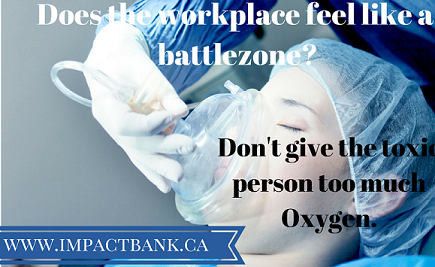Don’t give the Toxic Person in the office any oxygen! (Figuratively speaking of course)
In fairness, I need to qualify that it doesn’t help to vilify anyone.
Your toxic person may not be toxic to everyone. If however, it is impacting the team performance you may not be alone. AND you, as a leader, must do something about it. If you haven’t listened to my podcast do that first. Before acting let’s review a few things.
Most women feel they need to take responsibility for the feelings of others. Some think we are socialized to this and that may be so. Regardless, when you choose to assume responsibility for the feelings of others you give up a part of who you are and deprive, yes, deprive the team, group, community of your unique contribution.
SO, when your toxic person shows up in the office, don’t give him/her the power to define who you are—that can’t happen without your permission!
If the toxic person is a colleague/peer, you will be best served to “check yourself” in every exchange to ensure you are being yourself—remaining within yourself. The energy it takes to monitor yourself in every exchange will be exhausting, but worth it. If, instead, you just react, you will find yourself spending even more time repairing the damage you may do by allowing yourself to get caught in their web.
You may feel compelled to make a point, hold the toxic person at bay, or assert yourself more aggressively than usual. You may do this because you don’t want to give up your power. NOT WORTH IT! Your power, in a situation like this, is best expressed by remaining true to yourself. This is difficult work—it requires advanced work. One of the most important things you want to avoid is making it worse for the team while taking care of yourself so it requires Emotional Intelligence (a topic for another day) too.
I recall preparing for a team planning session where I knew, from experience, I would need to engage with my toxic person. I knew the entire senior team would be pulled into it if I didn’t go in with a calm, centered and thoughtful approach. I employed a unique blend of breathing exercises and visualization to anticipate and prepare for the worst. Because I had been working on it systematically, it didn’t require much time. My preparation allowed me to resist the pull into destructive exchanges. And while it was difficult, I still look back at how I handled that day with a sense of accomplishment. I spoke thoughtfully and took time to frame what I needed to say throughout the meeting and I was proud of how I handled myself. I handled it so well, I was acknowledged for it by my boss at the next performance review.
If the toxic person is a member of the team who reports to you (Direct Reports) I suggest you be even more cautious. It may be they have become toxic to you after you hired them or they may have been part of an inherited a team. Regardless, because of the differential in power in the relationship, you MUST be extremely thoughtful. Many leaders would discard the toxic person—that may be short-sighted. You must manage your emotions to ensure there is no favoritism which in turn may mean you over correct. I had this happen once in my career and I learned the importance of having a close relationship with an HR professional in Employee Relations. I could review my thinking and decision making with her which helped me maintain a balanced approach. While the toxic person and I never worked smoothly together, we developed a mutual respect that slowly softened the sharp edges and, I must say, I grew to respect him and his abilities over time.
I once had a toxic person as my boss. This was difficult in a very unique way. I was quite senior in the organization by this point and I learned I needed to protect my team from the poor relationship I had with the new Divisional President. He didn’t always appreciate this so the toxicity between us grew. The performance of my team continued to soar, making it very hard for the executive to make any of his dislike for me “stick”. It was sometimes difficult to be respectful while remaining clear and “standing my ground”. It was energy well spent as my department continued to be a top performing, highly regarded department throughout the organization. (I may tell this story in a future podcast: Managing UP—when you don’t respect your boss.)
I would not be surprised to hear I was toxic to others. Now as I look back I see a few moments where I may have been. Relationships are difficult. They just are. I wonder if by simply accepting they are difficult, we can, as leaders, significantly reduce the degree of toxicity.
Authenticity is a term that is over used today and it may be the most misunderstood. Figure out what it means for you. I suggest at its heart, authenticity in leadership is about being your best-self in the face of the most stressful circumstances while performing the face of the most difficult relationships. It requires you to dig deeply and learn about your limiting beliefs, attitudes and prevailing mindset. This will help you recognize your values and biases so you can be a thoughtful leader.
Next week I’ll be starting a series on Mindset. We will explore the link between Beliefs, Attitudes and Mindset and how together they determine the outcomes we produce in our work, life and world. First up next time, I will look at it from a big picture perspective—how they impact and shift community/cultural norms. Then we will get more into the weeds again with examples from the office.

